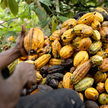CREATED IN COOPERATION WITH NESTLÉ POLSKA
Nestlé’s entry into Poland 30 years ago was more significant than a typical establishment of an office and distribution operations. Why?
One of the key factors behind Nestlé’s decision to enter the Polish market was its attractiveness. Clearly, the transformation period was the ideal time for a global company with such ambitions to enter Poland. However, what followed, including significant investments, was driven by the recognition of how compelling the Polish market was. This was due not only to its size but also the appeal of Polish brands and the local workforce. While cost considerations played a role, the high level of competence among our employees and their ability to learn quickly were equally important. All of these factors contribute to why the Polish market remains attractive, prompting Nestlé to invest here for three decades.
Which investments made by the company were the most significant?
In 1993, Nestlé introduced two brands to Poland, Nescafé and Nesquik. The following year, we initiated investments in local facilities, beginning with the confectionery factory in Kargowa, the water bottling plant in Nałęczów, and a substantial investment in the Winiary plant in Kalisz. We initially expanded with international brands and later invested in and preserved Polish brands and their traditions. The Nestlé culture uniquely combines access to cutting-edge solutions and know-how with respect for tradition and local producers. To this day, Winiary remains the largest brand in its category in the Polish market, demonstrating the added value we have provided. Subsequent Group investments, including a joint venture in a cereal factory in Toruń, a baby food plant, and Europe's largest pet food factory in Purina near Wrocław, have further strengthened our presence. Currently, we employ over 5,500 people in Poland across seven sites and an office in Warsaw.
How will Nestlé’s growth in Poland continue?
Our growth will be grounded in Nestlé’s core values, which revolve around “Good Food, Good Life”. We prioritise respect for people, communities, and the planet, guiding our development locally by implementing globally developed technologies. This entails continually improving our product portfolio in line with sustainability principles. An example is the introduction of plant-based meat substitutes under the Garden Gourmet brand.
In addition to product development, we leverage modern digital solutions both in production and in communicating with consumers. We are dedicated to enhancing our consumers’ lives by making them healthier and happier. The consumer always remains at the centre of our attention, and we shape our portfolio and introduce innovations with their needs in mind, including addressing climate change challenges. Being a modern company that prioritises the well-being of our thousands of employees is paramount to us.

























